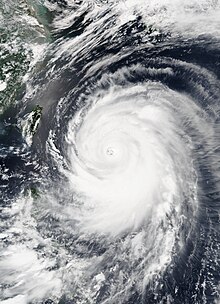 Typhoon Neoguri shortly after peak intensity on July 7 | |
| Meteorological history | |
|---|---|
| Formed | July 2, 2014 |
| Extratropical | July 11, 2014 |
| Dissipated | July 13, 2014 |
| Very strong typhoon | |
| 10-minute sustained (JMA) | |
| Highest winds | 185 km/h (115 mph) |
| Lowest pressure | 930 hPa (mbar); 27.46 inHg |
| Category 5-equivalent super typhoon | |
| 1-minute sustained (SSHWS/JTWC) | |
| Highest winds | 260 km/h (160 mph) |
| Lowest pressure | 918 hPa (mbar); 27.11 inHg |
| Overall effects | |
| Fatalities | 3 confirmed |
| Damage | $632 million (2014 USD) |
| Areas affected | Caroline Islands, Guam, Japan, South Korea |
| IBTrACS | |
Part of the 2014 Pacific typhoon season | |
Typhoon Neoguri (pronounced [nʌ.ɡu.ɾi]), known in the Philippines as Super Typhoon Florita, was a large and powerful tropical cyclone which struck Japan in 2014. The eighth named storm and the second typhoon of the annual typhoon season, Neoguri developed into a tropical storm on July 3 and then a typhoon on July 4. It rapidly deepened on July 5, reaching peak intensity late on July 6. Neoguri began to decay on July 7 and passed through Okinawa on July 8 and then making landfall over Kyushu as a severe tropical storm late on July 9. After Neoguri passed through the southern coast of Honshū on July 10, it became extratropical on July 11.